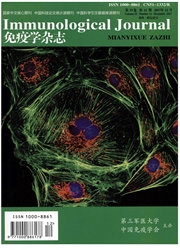

 中文摘要:
中文摘要:
肝细胞性肝癌(hepatocellular carcinoma,HCC)的死亡率位居世界恶性肿瘤的第2位,炎症是肝癌的主要原因。Toll样受体(Toll-like receptors,TLRs)为天然免疫的病原相关分子模式(pathogen associated molecular patterns,PAMPs)识别受体,TLRs不仅在免疫细胞中表达,在多种恶性肿瘤细胞及组织中均有表达,TLRs信号通路的激活可导致天然免疫系统产生炎症因子和趋化因子,最终激活获得性免疫系统。TLRs可能通过促进肿瘤细胞的增殖,协助肿瘤细胞的凋亡及免疫逃逸等机制参与原发性肝癌的发生发展。
 英文摘要:
英文摘要:
Hepatocellular carcinoma(HCC), mainly induced by inflammation, is the second cause of cancerrelated deaths worldwide. Toll-like receptors(TLRs), acting as pathogen associated molecular patterns(PAMPs)recognition receptors, express not only in immune cells, but also in a wide variety of cancer cells and tissues. In particular, the activation of Toll-like receptors signaling transduction can finally activate the acquired immune system through the generation of pro-inflammatory cytokines and chemokines in innate immune system. Researches showed that TLRs, promoting the proliferation of tumor cells, and assisting the apoptosis and immune escape of tumor cells, might involve in the occurrence and development of HCC.
 同期刊论文项目
同期刊论文项目
 同项目期刊论文
同项目期刊论文
 Prevalence of plasmid-mediated quinolone resistance determinants in Citrobacter freundii isolates fr
Prevalence of plasmid-mediated quinolone resistance determinants in Citrobacter freundii isolates fr Maternal thyroid function in the first twenty weeks of pregnancy and subsequent fetal and infant dev
Maternal thyroid function in the first twenty weeks of pregnancy and subsequent fetal and infant dev Heterogeneity of bla(IND) metallo-beta-lactamase-producing Chryseobacterium indologenes isolates det
Heterogeneity of bla(IND) metallo-beta-lactamase-producing Chryseobacterium indologenes isolates det 期刊信息
期刊信息
